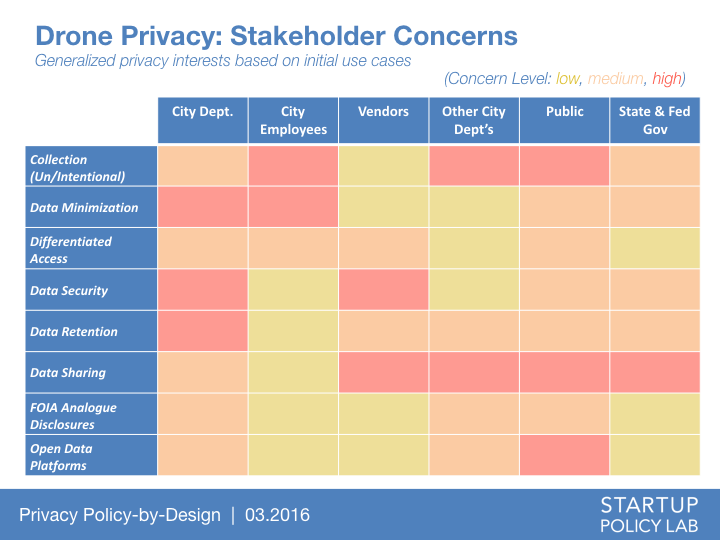Privacy for Citizen Drones: Privacy Policy-By-Design
By Timothy Yim, CTSP Fellow and Director of Data & Privacy at Startup Policy Lab | Permalink
Startup Policy Lab is leading a multi-disciplinary initiative to create a model policy and framework for municipal drone use.
Towards A More Reasoned Approach
Significant policy questions have arisen from the nascent but rapidly increasing adoption of drones in society today. The developing drone ecosystem is a prime example of how law and policy must evolve with and respond to emerging technology, in order for society to thrive while still preserving its normative values.
Privacy has quickly become a vital issue in the debate over acceptable drone use by government municipalities. In some instances, privacy concerns over the increased potential for government surveillance have even led to wholesale bans on the use of drones by municipalities.
Let me clear. This is a misguided approach.
Without a doubt, emerging drone technology is rapidly increasing the potential ability of government to engage in surveillance, both intentionally and unintentionally, and therefore to intrude on the privacy of its citizenry. And likewise, it’s also absolutely true that applying traditional privacy principles—such as notice, consent, and choice—has proven incredibly challenging in the drone space. For the record, these are legitimate and serious concerns.
Yet even under exceptionally strong constructions of modern privacy rights, including those enhanced protections afforded under state constitutions such as California’s, an indiscriminate municipal drone ban makes little long-term sense. A wholesale ban cuts off municipal modernization and the many potential benefits of municipal drone use—for instance, decreased costs and increased frequency of monitoring for the maintenance of public parks, docks, and bridges.
What a wholesale ban, or for that matter a blanket whitelisting, does accomplish is avoiding the admittedly difficult task of creating a policy framework to enable appropriate municipal drone use while preserving privacy. But these are questions that need to be considered, in order to move beyond the false binary dichotomy between privacy and municipal drone usage. In short, safeguarding privacy and enabling municipal innovation via new drone applications need not be mutually exclusive.
Privacy Policy-By-Design
Our privacy policy-by-design approach considers and integrates privacy principles—such as data minimization, retention, and onward transfer limits—early in the development of drone law and policy. Doing so will enable, much like privacy-by-design theory in engineering contexts, the creation of positive-sum policy solutions.
Critical to a privacy policy-by-design approach is (1) identifying potential stakeholders, both core and ancillary, and (2) understanding how their particular interests play out.
By identifying a broad array of stakeholders—including invested municipal agencies, interdisciplinary academia, industry, and civil society organizations—we hope to better understand how municipal drone use will impact the privacy interests of each stakeholder group. Here, privacy subject matter experts from interdisciplinary academia—law, public policy, and information studies—are critical to facilitate identification of potential issues, both to represent the public at large and to assist other stakeholder groups, which might not otherwise have the necessary expertise to fully assess their interests.
Oftentimes, this approach will benefit from convening key stakeholders in a face-to-face roundtable setting, especially those in other municipal departments and in groups outside municipal government altogether. A series of such tabletop roundtables, organized around likely use cases, provides an opportunity for stakeholder groups to identify general privacy concerns as well as facilitate early development of creative and nuanced solutions between parties.
Once municipal departments gain a comprehensive understanding of general stakeholder concerns, they can extrapolate those concerns for application in additional use cases and situations. City governments do not have the time or resources to convene roundtables for the entire range of potential drone applications. Nonetheless, takeaways from the initial set of use cases can provide invaluable insight into the potential privacy concerns of external stakeholders—helping avoid otherwise likely conflict in the future.
Understanding the multitude of privacy interests by different stakeholders is key to the creation of innovative, positive-sum solutions that safeguard privacy while enabling modern drone use in and by cities. The following table represents a theoretical, high-level mapping of stakeholder concerns in the municipal drone space.
Evolving Data-Driven Policy
Finally, it’s important to realize that a privacy policy-by-design approach should not be pursued in isolation. A growing fraction of recently proposed or enacted legislation has authorized the ancillary collection of relevant data around the new legislation itself—creating opportunities in the future to further evolve policy via real-world usage. So too, we propose that appropriate data collection modules be added to municipal drone use processes to confirm that established policies are creating the proper incentives and disincentives.
Our overarching goal is to develop a framework that enables law and policy to evolve in lockstep with emerging technologies, so that society can innovate and thrive without compromising on its normative values.
If you are one of the interested stakeholder groups above or are otherwise interested in participating in our roundtables or research, please let us know at drones@startuppolicylab.org.


No Comments